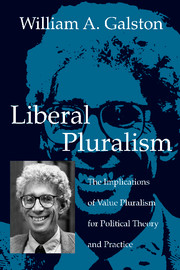1 - Pluralism in Ethics and Politics
Published online by Cambridge University Press: 20 March 2010
Summary
This book brings together and develops themes that have occupied me over the past decade of scholarly and public life. It defends a liberal theory of politics that is pluralist rather than monist and (in John Rawls's sense) comprehensive rather than freestanding or “political.”
LIBERALISM
Let me begin by stating what I believe it means to be a liberal, in the theoretical, not political, sense of the term.
Liberalism requires a robust though rebuttable presumption in favor of individuals and groups leading their lives as they see fit, within a broad range of legitimate variation, in accordance with their own understanding of what gives life meaning and value. I call this presumption the principle of expressive liberty. This principle implies a corresponding presumption (also rebuttable) against external interference with individual and group endeavors.
To create a secure space within which individuals and groups may lead their lives, public institutions are needed. Liberal public institutions may restrict the activities of individuals and groups for four kinds of reasons: first, to reduce coordination problems and conflict among diverse legitimate activities and to adjudicate such conflict when it cannot be avoided; second, to prevent and when necessary punish transgressions individuals may commit against one another; third, to guard the boundary separating legitimate from illegitimate variations among ways of life; and finally, to secure the conditions – including cultural and civic conditions – needed to sustain public institutions over time.
- Type
- Chapter
- Information
- Liberal PluralismThe Implications of Value Pluralism for Political Theory and Practice, pp. 3 - 12Publisher: Cambridge University PressPrint publication year: 2002



